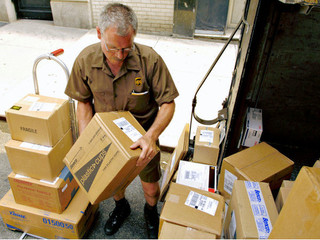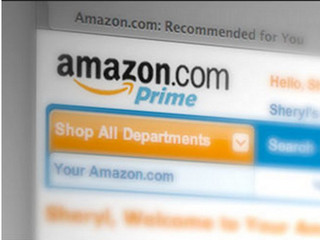DrFirst buys prior authorization automation platform Myndshft
This will allow DrFirst to accelerate its growth in the specialty medication space
Read more... 
It was a big year for commerce. There was drama, betrayal, lust, and greed. There were also IPOs, rumored IPOs, acquisitions, and delivery mishaps. Thus, on this New Year’s Eve, I give you the top ten commerce stories of the year, starting with:
This one was arguably the game-changer of the year, since it was the first time the world had caught a glimpse of a major company looking into the use of commercial drones for delivery purposes. The lightweight “Octocopters” can easily transport packages weighing five pounds or less within a five-mile radius within hours of purchase. That translates to 80% of Amazon’s cargo. The bad news: we definitely won’t see them before 2015. But the need for delivery drones was driven home this Christmas when millions of people didn’t get their packages on time, which leads us to number two.
2. The Christmas delivery fiasco.
So many people shopped online this year—and so many people put in last-minute orders just days before Christmas—that the volume of orders completely overwhelmed UPS’s and FedEx’s systems. Result: items that were supposed to be guaranteed two-day delivery didn’t arrive by Christmas Eve. Retailers like Amazon, Walmart, Kohl’s, and more were affected. Amazon issued $20 gift cards as recompense to all those who didn’t receive their Christmas gifts in time.
3. Target hit by massive credit card hacking.
Speaking of Christmas fiascos, the credit card numbers of you, me, and everybody we know were probably stolen when we made purchases at Target in the first two weeks of December. The massive data breach is believed to have affected 40 million cards that were swiped through card readers in-store at any one of Target’s 1,797 U.S. locations. Target.com purchases were, surprisingly, not affected. Merry Christmas, ya filthy animal.
And now for some positive news: Zulily became the first flash sale site to go public, beating out the likes of Gilt Groupe, for which an IPO has long been rumored. Shares closed at $37.06, up 68.5% from the original price of $22. Altogether, the company raised $253 million at a valuation of $4.6 billion. Today, Zulily shares are up an additional 8.9% to $41.05, with a market cap of $9.62 billion.
Speaking of IPOs, here’s a good one: Square is reportedly looking into a 2014 public offering. Around the same time fellow Jack Dorsey-creation Twitter was kicking off its IPO, word on the street was that Square execs were in talks with several banks, including Goldman Sachs and Morgan Stanley, about a possible 2014 offering—even though Square is not yet profitable. While the company has been valued at $3.25 billion, as much as 80% of its sales are handed over to credit card companies. That means that while sales are projected to come in at $550 million on payment volume of $20 billion, Square’s revenue will likely be $110 million to $165 million, according to insiders who spoke with the WSJ. But Jack Dorsey reportedly told employees that he will soon reveal his plan to make Square profitable by 2015.
6. Groupon CEO Andrew Mason gets the boot.
In many ways, it was the death of a dream. Can you be the CEO of a hugely popular and growing business without taking yourself too seriously? Do you have to drink the Kool-Aid and give out bullshit lines like “at X company, we value our customers above all else”? Short answer: No. Mason was fired in February, after Groupon posted horrendous fourth quarter earnings, in which it revealed a loss of 12 cents a share. Analysts had been expecting a loss of two cents a share. Ouch. Groupon’s stock plummeted 20% after the earnings call. The ouster was necessary and Groupon has seen some great progress since, but that doesn’t diminish the fact that Andrew Mason was a cool CEO who openly mocked business rhetoric and culture. He even did so in his farewell letter to employees, writing: “After four and a half intense and wonderful years as CEO of Groupon, I’ve decided that I’d like to spend more time with my family. Just kidding — I was fired today. If you’re wondering why … you haven’t been paying attention.”
7. JustFab acquires Shoedazzle.
And then there were two. The L.A. Shoe Wars—long waged between the three major players: JustFab, Shoedazzle, and Beachmint—lost an opponent over the summer when JustFab acquired Shoedazzle. The deal—rumored to be between $10 and $30 million—came less than one year after founder Brian Lee reclaimed his spot at the helm of the sinking ShoeDazzle ship. Lee, who is also CEO of The Honest Company, had been attempting to right ShoeDazzle since last September, and while was able to stop the careening losses the company was experiencing following Bill Strauss’s not-so-great decision to cut subscriptions, ShoeDazzle had not been able to climb back up to the peak it saw in 2011, when it was valued at $200 million. A month later, JustFab raised $40 million and added three million customers in Europe. Hot damn!
8. Beachmint founders are fired, except they’re not.
This was just kind of a weird one. Beachmint had some struggles and was long rumored to be on its way out—and then PandoDaily broke the news in July that Beachmint founders Josh Berman and Diego Berdakin had been fired by the board. The company was also said to be returning $20 million of the $73.5 million it’s raised since 2010. Only it wasn’t true. Several Beachmint board directors went on record to deny the rumor, and Josh Berman said the whole thing was completely false. Whoops.
9. KlearGear attempts to circumvent the First Amendment.
Last month, geekery purveyor KlearGear came under fire when it actually had the balls to fine a customer $3,500 for posting a negative review of the company—three years ago. As the story goes: Jen Palmer’s husband had ordered some novelty geek items on KlearGear several years ago, and when the items still hadn’t arrived after 30 days, PayPal canceled the order. When Jen Palmer attempted to contact KlearGear, she couldn’t get in touch with a human being to get the problem cleared up. So Palmer left a negative review on RipoffReport.com, in which she said the company had “horrible customer service practices.” Three years later, Jen Palmer’s husband received an email informing him that he was in violation of the non-disparagement clause in the terms of service and was being fined $3,500. The Palmers couldn’t get the negative review removed unless they forked up $2,000, so their credit was dinged. Later, KlearGear was found to employ a lot of shady practices beyond their bogus non-disparagement clause.
10. Amazon Prime now has 16 million members—and all that money is profit.
In March, MorningStar analyst R.J. Hottovy estimated that Amazon Prime had 10 million members, based on research from Consumer Intelligence Research Partners. CIRP later updated that number in December—projecting Amazon Prime membership to be slightly north of 16 million. That’s a 60% increase in just nine months. Thing is, that $79 annual subscription fee? Almost pure profit. Hottovy estimated that Amazon pockets $78 of those dollars, and that Prime subscription fees made up some one-third of Amazon’s consolidated segment operating income in 2012. Additionally, CIRP found that Prime customers spend significantly more on Amazon than non-Prime members: $1,340 per year to $708 per year, respectively.
Image source: icgeeks.org
This will allow DrFirst to accelerate its growth in the specialty medication space
Read more...The company initially raised $3 million in seed funding when it launched in October
Read more...This is the company's first fundraising since 2019 and brings its total capital to $103M
Read more...








